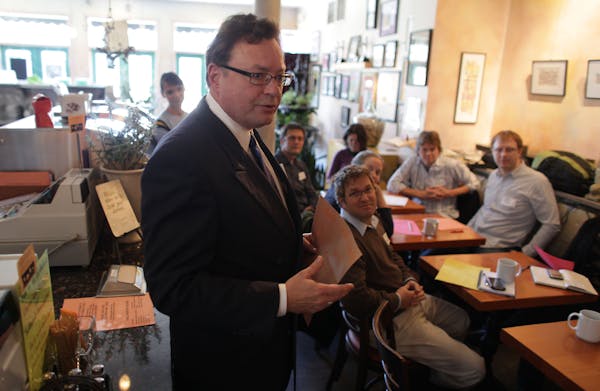What began with the complaints of a handful of Twin Cities conservationists about glass walls at U.S. Bank Stadium is now a scientific study that could have a far-ranging effect on birds and buildings.
The state and the Vikings are paying $300,000 to study the dangers to birds built into the two-year-old stadium with its massive glass facades and doors.
Leading the effort is Scott Loss, an assistant professor at Oklahoma State University with strong academic bona fides.
To Loss and other bird mortality experts, the Minnesota study signifies the elevation of a conservation issue with reach far beyond the $1.1 billion stadium.
"This is one piece of a bigger picture that we're trying to understand," Minnesota Audubon spokeswoman Ashley Peters said.
The study is looking not just at U.S. Bank Stadium but other parts of the region and weather patterns.
It focuses on two fall and two spring migration seasons, with the last coming this fall. The results won't be public until next year — after the results undergo rigorous scientific peer review.
Like everyone involved in the study, Loss won't talk about the methodology. But the University of Minnesota Ph.D. recipient said he's excited that a prominent business, the Vikings organization, and the state took bird concerns seriously enough to pay for the migration study.
Retrofitting the design
Loss said it's well established that birds crash into buildings, and the study will quantify the problem at U.S. Bank Stadium while also looking at a "broader suite of buildings."
Throughout construction of the stadium, funded with money from the state and the Vikings, the Minnesota Sports Facilities Authority (MSFA) rejected pleas to make the building bird-friendly, arguing that bird deterrents such as etched glass would interfere with the airy aesthetic of the building.
MSFA Chairman Mike Vekich didn't come aboard until last year, so he wasn't involved in the earlier discussions. His position: "Are we open to looking at mitigation? Yes."
The MSFA will "very seriously look at the recommendations," Vekich said, adding that practicality and financial concerns will be weighed. He also raised the prospect of phasing in safety measures.
Another design challenge
The MSFA is in the process of addressing another expensive issue with the building: the need for a "darkening solution" to block excessive light during the NCAA men's basketball Final Four next April. The MSFA is privately reviewing bids.
Jerry Bahls, president of the Minneapolis Audubon Chapter, is one of the original agitators on behalf of the birds. "We're hopeful something interesting will come out of all this, although we are not optimistic," he said.
Bahls said he believes the study period is too short to get solid results.
Peters said the scientific community "really needed a scientifically valid study" to understand how birds maneuver.
That's particularly important for downtown Minneapolis, which is close to the Mississippi River, one of the major migratory flyways.
"We are hoping to get them through these downtown areas so they can get to parks and breeding grounds," she said.
'Gold standard' study
After Loss completes the study, it will undergo scientific peer review, which the professor describes as the "gold standard," the ultimate stamp of approval from the scientific community.
Other experts have faith in Loss and his work but say there's little doubt about one aspect of the outcome.
"Whenever you have birds and glass together, you're going to have kills," said Daniel Klem, an ornithologist and professor at Muhlenberg College in Allentown, Pa. "And you've got a lot of glass."
To mitigate the bird mortality, he sees an external film as the only option. A transparent or translucent film had been discussed for U.S. Bank Stadium, but it's unclear whether one exists that would work.
Christine Sheppard, a researcher at the American Bird Conservancy, said the stadium could become a rallying point for more bird safety measures.
"The Vikings stadium has become extremely symbolic," Sheppard said.
Rochelle Olson • 612-673-1747 Twitter: @rochelleolson

A tale of 124 hoarded Minnesota cats has at least a hundred happy endings

Walz, St. Paul leaders urge support for copper wire theft bill: 'We've got to get in front of it'
Body of missing canoeist, 15, recovered from southwest Minnesota lake

High winds flipped a FedEx truck traveling on Bong Bridge in Duluth

